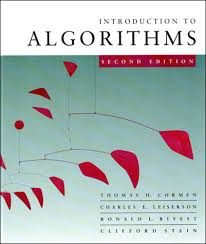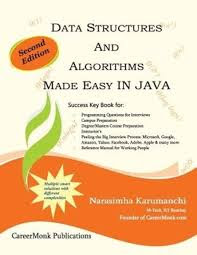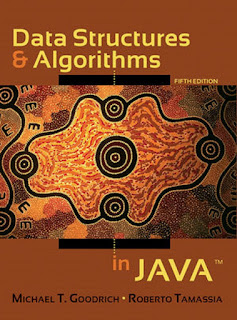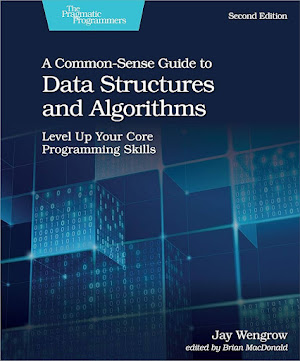Data Structure and Algorithms books are often taught as textbooks in various universities, colleges, and Computer Science degree courses, yet, when you put programmers in a situation, where they need to find and decide, which data structures and algorithms to use to solve a problem, they struggles. I have seen this, and I think one reason for this is perspective. When you read something like a textbook and your perspective is just to do well in the exam, you might not be thinking about learning and applying that knowledge to real-world problems. Since data structures and algorithms are the core of any programming problem, it becomes extremely important for programmers to master them even if you have learned well during academics.
Earlier, I have shared best Data Structure and Algorithms courses and websites and in this article, I am sharing five of my favorite books on data structures and algorithms, which I think are a great read and can help every programmer to master data structure and algorithms.
Earlier, I have shared best Data Structure and Algorithms courses and websites and in this article, I am sharing five of my favorite books on data structures and algorithms, which I think are a great read and can help every programmer to master data structure and algorithms.
After reading some feedback that a combination of book and online courses work better for beginners, I have also shared some online data structure and algorithms courses you can join along with these books.
I have chosen these books because of different reasons. Some books are really easy to read and their focus is aligned to my expectation, some of them are really comprehensive and can be used as reference material, and few of them offers different perspective of using data structures and algorithms e.g. while solving a real-world problem or helping to crack interviews at Google, Amazon, Microsoft or Facebook.
It's hard to judge your knowledge of data structure and algorithms by knowledge-based questions because that's not how they are used in a project. It doesn't help to know about every single detail of a Car if you can't even drive.
These data structure and algorithms books have helped me to find and fill in gaps and taught me a lot of things about different data structures like stacks, queues, linked lists, arrays, hash tables, heaps, trees, and graphs. If you are using a different data structure and algorithm book, which is good and not on this list, you can share it with us.
You should also try to implement and use those data structures on your own like writing your NAry tree to hold hierarchical data, writing your own hash table even though you have HashMap in Java.
I have chosen these books because of different reasons. Some books are really easy to read and their focus is aligned to my expectation, some of them are really comprehensive and can be used as reference material, and few of them offers different perspective of using data structures and algorithms e.g. while solving a real-world problem or helping to crack interviews at Google, Amazon, Microsoft or Facebook.
It's hard to judge your knowledge of data structure and algorithms by knowledge-based questions because that's not how they are used in a project. It doesn't help to know about every single detail of a Car if you can't even drive.
These data structure and algorithms books have helped me to find and fill in gaps and taught me a lot of things about different data structures like stacks, queues, linked lists, arrays, hash tables, heaps, trees, and graphs. If you are using a different data structure and algorithm book, which is good and not on this list, you can share it with us.
Top 7 Data Structure and Algorithm Books
Here is my list of some of the good books to learn data structure and algorithm. Since both data structure and algorithm are both languages independent, but I suggest you pick a book that has an example in your preferred languages like C, C++, Java, or Python.You should also try to implement and use those data structures on your own like writing your NAry tree to hold hierarchical data, writing your own hash table even though you have HashMap in Java.
Ok, now let's see my favorite algorithm and data structure books:
This is one of the best books on Computer Algorithms, it's written by four authors, one of them is Thomas H. Cormen, whose another book Unlocked Algorithm is also the most recommended book to learn algorithms.
This book is a lot more comprehensive and covers lots of different algorithms and advanced problem-solving techniques like greedy algorithms, dynamic programming, Amortized Analysis, along with elementary data structures like Stacks and Queues, Array and linked list, Hash tables, Tree, and Graph.
This is one of the best books on Computer Algorithms, it's written by four authors, one of them is Thomas H. Cormen, whose another book Unlocked Algorithm is also the most recommended book to learn algorithms.
This book is a lot more comprehensive and covers lots of different algorithms and advanced problem-solving techniques like greedy algorithms, dynamic programming, Amortized Analysis, along with elementary data structures like Stacks and Queues, Array and linked list, Hash tables, Tree, and Graph.
This book is a unique combination of completeness and rigorous.
Another good thing about this book is that algorithms are explained in English, and in pseudo-code, which can be understood by even programmers, who have just started programming, but if you want to learn Data Structure in Java, then you can also combine this book with Data Structures and Algorithms: Deep Dive Using Java course on Udemy.
It's equally useful for all kinds of programmers like senior, experienced and freshers and in all kinds of programming languages like Java, C or C++. One of the must-reads books on Algorithms for software programmers and developers.
Algorithms are complex and hard to understand, even for a computer science graduate. Any book, which makes a readable attempt of the algorithm, by associating with real worth things, does a huge favor for its reader.
Algorithm Unlocked is one such book, which presents some of the widely known computer algorithms in the field of finding the shortest path, searching and sorting algorithms, String related algorithms, cryptography and data compression algorithms, and some interesting problems.
This book is one of the most engaging and readable books on the topic of algorithms and worth of every penny spent on it.
Another good thing about this book is that algorithms are explained in English, and in pseudo-code, which can be understood by even programmers, who have just started programming, but if you want to learn Data Structure in Java, then you can also combine this book with Data Structures and Algorithms: Deep Dive Using Java course on Udemy.
It's equally useful for all kinds of programmers like senior, experienced and freshers and in all kinds of programming languages like Java, C or C++. One of the must-reads books on Algorithms for software programmers and developers.
Algorithms are complex and hard to understand, even for a computer science graduate. Any book, which makes a readable attempt of the algorithm, by associating with real worth things, does a huge favor for its reader.
Algorithm Unlocked is one such book, which presents some of the widely known computer algorithms in the field of finding the shortest path, searching and sorting algorithms, String related algorithms, cryptography and data compression algorithms, and some interesting problems.
This book is one of the most engaging and readable books on the topic of algorithms and worth of every penny spent on it.
The only thing, I found this book lacks is that it only covers Algorithms and not data structures, as it can not be used as a reference book.
It's the best to use is as a companion, along with a much more comprehensive book on data structures and algorithms but you can also combine this book with Algorithms and Data Structures - Part 1 and 2 courses from Pluralsight which covers both data structure and algorithms to cover both.
This is another data structure and algorithm book, which scores well on readability and practical usefulness. I particularly like its clean, clear and concise explanation; followed by real-world use cases and then lots of problems to master a particular data structure or algorithm.
The only thing, which is not per my convenience was its examples, which are written in C programming language. If you can easily manage that then it's a very good book to learn data structure. In fact, this encouraged me to write my own implementation in Java while going through it, which certainly helps in the long run.
Remember, getting an objective feel of what is data structure, how does it work is quite different than implementing same data structure by yourself, and then trying different things like finding cycles in linked list or finding middle node of linked list in single pass, is a good exercise after you implemented linked list data structure in Java.
Btw, if you are preparing for coding interview then you will also find Grokking the Coding Interview: Patterns for Coding Questions on Educative very useful. This book shares some of the common patterns which apply to multiple coding problems.
It's the best to use is as a companion, along with a much more comprehensive book on data structures and algorithms but you can also combine this book with Algorithms and Data Structures - Part 1 and 2 courses from Pluralsight which covers both data structure and algorithms to cover both.
This is another data structure and algorithm book, which scores well on readability and practical usefulness. I particularly like its clean, clear and concise explanation; followed by real-world use cases and then lots of problems to master a particular data structure or algorithm.
The only thing, which is not per my convenience was its examples, which are written in C programming language. If you can easily manage that then it's a very good book to learn data structure. In fact, this encouraged me to write my own implementation in Java while going through it, which certainly helps in the long run.
Remember, getting an objective feel of what is data structure, how does it work is quite different than implementing same data structure by yourself, and then trying different things like finding cycles in linked list or finding middle node of linked list in single pass, is a good exercise after you implemented linked list data structure in Java.
Btw, if you are preparing for coding interview then you will also find Grokking the Coding Interview: Patterns for Coding Questions on Educative very useful. This book shares some of the common patterns which apply to multiple coding problems.
This means you don't need to remember the hundreds of Leetcode problems. Just master these 15 underlying patterns to interview questions, and you'll be able to tackle anything you face on the interview
Coming back to the book, you can certainly buy this book on readability, clear and concise explanation and, more importantly, nontrivial examples. One of the best book to learn data structure and algorithms for beginners.
This is another conventional book on Algorithms and Data structures. Two things, which I liked about this book are, examples are given in my favorite Java programming language and you can use this book as a reference for learning data structures like the stack, queue, linked list, tree or graph.
The good thing about this book is that if not only focuses on data structures and algorithms but also on Java, which makes it an ideal choice for Java programmers.
Coming back to the book, you can certainly buy this book on readability, clear and concise explanation and, more importantly, nontrivial examples. One of the best book to learn data structure and algorithms for beginners.
This is another conventional book on Algorithms and Data structures. Two things, which I liked about this book are, examples are given in my favorite Java programming language and you can use this book as a reference for learning data structures like the stack, queue, linked list, tree or graph.
The good thing about this book is that if not only focuses on data structures and algorithms but also on Java, which makes it an ideal choice for Java programmers.
Though it doesn't cover a lot of algorithms, it did cover algorithms related to directed and cyclic graphs, minimum spanning trees and comes up with a lot of exercises for practice.
Not the best, but a good book to learn algorithm and data structure in Java but you can also combine this book with this Data Structures & Algorithms course from Udemy which not only covers advanced data structure and algorithms like Trie, AVL trees, Graph but also Dynamic programming and Greedy Algorithms, which are very important for coding interviews.
Algorithms for Interviews are quite different than previous books on data structures and algorithms. It offers a different perspective of designing and using algorithms by applying them to different interview questions.
If you are preparing for software engineer interviews at Google, Microsoft, Amazon or Facebook, you can expect a lot of questions from the data structure and algorithms, and this book helps a lot. I liked this book because I learned a lot of things, which I haven't learned by following conventional books on data structures and algorithms.
It's not a textbook, neither a comprehensive guide of algorithms, but it's worth reading to improve your understanding of algorithm and problem-solving skills. It definitely deserves a place on the bookshelf of a programmer, who like to learn from other's experience.
Though, for better preparation, I also suggest you check out Master the Coding Interview: Data Structures + Algorithms course on Udemy which provides live solutions to some of the top coding problems from Google, Amazon, and Facebook, which will help you to better understand the approach and methods.
Not the best, but a good book to learn algorithm and data structure in Java but you can also combine this book with this Data Structures & Algorithms course from Udemy which not only covers advanced data structure and algorithms like Trie, AVL trees, Graph but also Dynamic programming and Greedy Algorithms, which are very important for coding interviews.
Algorithms for Interviews are quite different than previous books on data structures and algorithms. It offers a different perspective of designing and using algorithms by applying them to different interview questions.
If you are preparing for software engineer interviews at Google, Microsoft, Amazon or Facebook, you can expect a lot of questions from the data structure and algorithms, and this book helps a lot. I liked this book because I learned a lot of things, which I haven't learned by following conventional books on data structures and algorithms.
It's not a textbook, neither a comprehensive guide of algorithms, but it's worth reading to improve your understanding of algorithm and problem-solving skills. It definitely deserves a place on the bookshelf of a programmer, who like to learn from other's experience.
Though, for better preparation, I also suggest you check out Master the Coding Interview: Data Structures + Algorithms course on Udemy which provides live solutions to some of the top coding problems from Google, Amazon, and Facebook, which will help you to better understand the approach and methods.
6. A Common-Sense Guide to Data Structures and Algorithms, Second Edition: Level Up Your Core Programming Skills
This Data Structure and Algorithm book by Jay Wengrow is a comprehensive resource that goes beyond abstract concepts, offering a practical and hands-on approach to mastering algorithms and data structures.With a focus on real-world scenarios, the book will teach you techniques applicable to daily production code, using examples in popular programming languages like JavaScript, Python, and Ruby.
In this second edition, new chapters on recursion, dynamic programming, and the practical application of Big O notation have been added, providing readers with essential tools to enhance the efficiency of their code.
The book delves into the importance of choosing the right data structures, such as arrays, linked lists, and hash tables, and demonstrates how these choices profoundly impact the performance of the code. Readers learn to use recursion to solve complex problems and explore advanced data structures like binary trees and graphs, particularly useful for specialized applications like social networks and mapping software.
The inclusion of exercises with detailed solutions allows for practical reinforcement of the concepts presented.
Overall, this edition offers valuable insights and strategies for optimizing code, making it faster and more scalable, making it an indispensable guide for developers aiming to level up their core programming skills.
For better learning experience, you can also join the "Python Data Structures & Algorithms + LEETCODE Exercises" course on Udemy. This is a comprehensive resource designed for mastering data structures and algorithms in Python, tailored for success in coding interviews.
With animated examples, LEETCODE exercises, and a focus on efficient learning, this guide provides an in-depth understanding for cracking coding interviews, making it an invaluable companion for programmers aiming to excel in technical assessments.
"Grokking Algorithms: An Illustrated Guide for Programmers and Other Curious People" by Aditya Bhargava is a captivating and fully illustrated guide designed to make the learning of common algorithms an enjoyable and accessible experience. 7. Grokking Algorithms: An Illustrated Guide for Programmers and Other Curious People
The book starts with fundamental algorithms like sorting and searching and progressively delves into more complex topics such as data compression and artificial intelligence. Adorned with over 400 pictures and detailed walkthroughs, the book provides an engaging learning experience.
The inclusion of Python-based code samples allows readers to comprehend and implement the algorithms effortlessly. The book emphasizes performance trade-offs between algorithms, enabling readers to make informed choices based on efficiency.
Aditya Bhargava's approach is friendly and practical, making this book suitable for self-taught programmers, engineers, or anyone seeking to enhance their understanding of algorithms.
By the end of the book, you will have not only mastered widely applicable algorithms but also gained insights into when and how to apply them effectively in their own programming endeavors.
Overall, "Grokking Algorithms" is a valuable resource that demystifies algorithms and turns the learning process into an engaging journey for programmers of all levels."
And, if you need a Python data structure course to accompany this book, I recommend you to join The Complete Data Structures and Algorithms Course in Python course in Udemy. This course offers a comprehensive learning experience, including 100+ DSA interview questions for successfully navigating FAANG interviews.
7. Coding Interview Patterns: Nail Your Next Coding Interview
This is another fantastic book I would recommend to programmer. This book is not completely a data structure and algorithm book but you will learn valuable lesson on how to apply algorithms and patterns while solving coding problems in this book.
You will learn patterns like Two pointer pattern which can be used to solve coding problems like finding kth element on linked list or finding middle element of linked list. Then you will learn about fast and slow pointers which can be used to find if linked list contain cycle.
You will also learn patterns like BFS and DFS and many others which can be used to solve coding problems related to binary tree and graphs.
Overall you will find 101 real coding interview problems with detailed solutions and intuitive explanations that guide you through each problem as if you were solving it in a live interview, and most importantly 1000+ diagrams to illustrate key concepts and patterns.
And, if you want to learn quickly, you can also combine this book with Grokking the Coding Interview: Patterns for Coding Questions course on DesignGurus.io
That's all on my list of must-read books data structures and algorithms. This list is equally useful to both Java and C, C++ programmers, or better any programmer because it's a common programming concept and used in all kinds of projects, written in different programming languages.
At least one book on data structures and algorithms must always be on a programmer's self, along with some timeless classic like Clean Code and Effective Java.
Related Data Structure and Algorithm Interview Questions from Javarevisited Blog
Related Data Structure and Algorithm Interview Questions from Javarevisited Blog
- Top 10 Courses to learn Data Structure in Java (courses)
- Top 15 Data Structure and Algorithm Interview Questions (see here)
- 5 Free Courses to learn Algorithms for Beginners (courses)
- Top 20 String coding interview questions (see here)
- 100 Data Structure and Algorithms interview questions (dsa questions)
- 10 Books and Courses to Crack Coding Interviews (books)
- 133 core Java interview questions of the last 5 years (see here)
- 10 Books to Master Algorithms in-depth (books)
- Top 30 Array Coding Interview Questions with Answers (see here)
- Top 30 linked list coding interview questions (see here)
- Grokking Algorithms - Best Book to learn Algorithms for Beginners (review)
- Top 50 Java Programs from Coding Interviews (see here)
- Top 5 books on Programming/Coding Interviews (list)
- 5 Best Courses to learn Data Structure and Algorithms for Interviews (courses)



















8 comments :
Or you could read the original.
https://en.wikipedia.org/wiki/Algorithms_%2B_Data_Structures_%3D_Programs
@Jan, definitely a nice book but I found it slightly difficult to read, mainly due to examples given in PASCAL.
What about Robert Sedgewicks: Algorithms (java version); http://algs4.cs.princeton.edu/home/
One of my favorites( but for intermediate leve , I guess)
Robert Sedgewicks: Algorithms is indeed a great book and its also free to read online. I have read it couple of times and it's even used in coursera's algorithm course, which is also free.
Plz suggest books for android
@hardik, sure I will suggest some book for Android soon. Thanks
Here is another list of 10 free Java Programming books, worth checking it out too. Cheers ...
hello brother can i get pdf of "Robert Sedgewicks"
Post a Comment